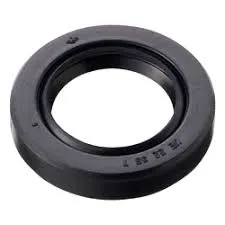9 月 . 12, 2024 07:00 Back to list
High-Quality PTFE Oil Seals for Superior Performance
Understanding PTFE Oil Seals Features and Applications
PTFE (Polytetrafluoroethylene) oil seals are essential components in a wide range of mechanical applications, primarily due to their excellent chemical resistance, high-temperature tolerance, and low friction properties. These seals are designed to keep lubricants in and contaminants out, ensuring the smooth operation of machinery and equipment. This article explores the key features, benefits, and applications of PTFE oil seals.
Key Features of PTFE Oil Seals
1. Chemical Resistance PTFE oil seals exhibit outstanding resistance to a wide array of chemicals, including acids, bases, and solvents. This makes them particularly useful in environments where conventional rubber seals would degrade or fail.
2. High-Temperature Stability PTFE can withstand temperatures ranging from -268°C to 260°C (-452°F to 500°F), making it suitable for high-temperature applications. Its ability to maintain integrity under extreme conditions is a significant advantage for industries such as automotive and aerospace.
3. Low Friction One of the hallmark characteristics of PTFE is its low coefficient of friction. This property reduces wear and tear on moving parts, contributing to the longevity and efficiency of machines. In applications like pumps and compressors, reduced friction translates to lower energy consumption.
4. Non-adhesive Surface PTFE's non-stick properties ensure that dirt, grime, and other contaminants do not adhere to the seal, maintaining a cleaner operational environment. This feature is particularly beneficial in applications where cleanliness is paramount, such as pharmaceuticals and food processing.
Benefits of Using PTFE Oil Seals
ptfe oil seal

- Extended Durability The combination of chemical and thermal resistance ensures that PTFE oil seals have a longer lifespan compared to traditional rubber seals, reducing maintenance costs and downtime.
- Versatility PTFE oil seals can be manufactured in various shapes and sizes, allowing them to be customized for specific applications. This flexibility makes them suitable for diverse industries, from automotive to aerospace, and from oil and gas to manufacturing.
- Enhanced Performance The low friction characteristics of PTFE oil seals contribute to improved performance in machinery. They enable smoother operation, lower noise levels, and overall enhanced efficiency.
Applications of PTFE Oil Seals
PTFE oil seals are used in numerous applications around the globe. In the automotive industry, they are commonly found in engines, transmissions, and differentials, where they help to keep lubricants sealed and functioning correctly. In the aerospace sector, PTFE seals are critical for engines and hydraulic systems, where reliability and performance are non-negotiable.
In the oil and gas industry, these seals are invaluable for ensuring the integrity of equipment exposed to harsh environmental conditions. Additionally, they are frequently used in chemical processing, where robust protection against aggressive substances is required.
Conclusion
PTFE oil seals are a vital component in many mechanical systems, providing exceptional performance in challenging environments. Their unique properties, including chemical resistance, high-temperature stability, and low friction, make them a preferred choice across various industries. As technology continues to advance, the role of PTFE oil seals is expected to grow, further cementing their place as essential elements in modern machinery and equipment.